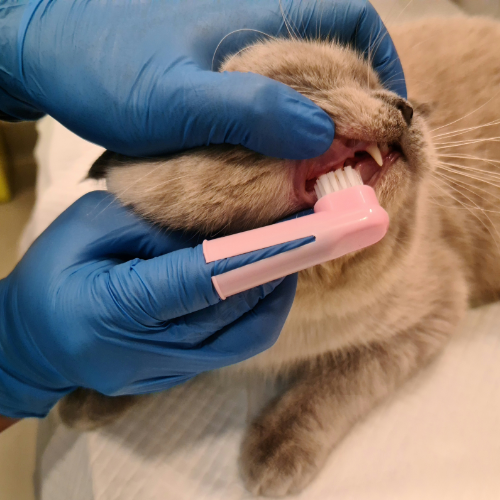
A Guide to Home Dental Care for Pets
Our four-legged friends bring boundless joy and cuddles into our lives, and ensuring their well-being includes maintaining their oral health. In this guide, we’ll explore the ins and outs of pet home dental care, from cleaning techniques to preventing tartar buildup and potential dangers associated with neglecting your furry friend’s dental hygiene.
First and foremost, regular brushing is a fundamental aspect of dental home care for both dogs and cats. While introducing this practice may require more patience than teaching a cat to do algebra, the benefits far outweigh the initial challenges. Think of it as a bonding experience – you, your pet, and the promise of fresh breath snuggles!
Now, while we can’t host a pet dental spa at home, there are ways to manage tartar. Specially designed dental chews, toys, and specific diets can help reduce tartar buildup between veterinary cleanings. It’s important to mention that using human toothpaste on pets is a big no-no. Instead, opt for toothpaste that is formulated specifically for dogs or cats, ensuring it is safe for them to swallow.
What about Human mouthwash?
Nope, not for our furry pals. They prefer flavors that don’t sting. In fact, Human mouth wash is not suitable for pets due to its alcohol content and other potentially harmful ingredients. Choose oral rinses designed for pets formulated to promote dental health without posing risks if ingested.
We know baking soda is popular when it comes to teeth. So we know that this question is coming. To answer that, Baking soda can be used cautiously as a natural teeth-cleaning agent for pets. Create a paste by mixing a small amount of baking soda with water, then apply it to a pet toothbrush or a finger brush designed for pets. Exercise care to avoid excessive use, as baking soda can be abrasive and lead to irritation.
Several natural ingredients can aid in plaque removal for pets. Coconut oil, known for its antimicrobial properties, can be applied to a pet’s teeth or added to their food. Fresh parsley, rich in chlorophyll, is believed to neutralize odors and support oral health. Always consult with your veterinarian before introducing new supplements or ingredients to your pet’s diet.
Now, for the infamous question: Is Tartar painful?
Tartar can be painful for pets, creating a rough surface on teeth that irritates gums, leading to inflammation and gingivitis. If left untreated, tartar can progress to more severe conditions, such as periodontal disease, causing pain, tooth loss, and potential jawbone issues.
Preventing tartar involves a combination of at-home care and regular veterinary check-ups. Regular brushing, incorporating dental chews and toys, and providing specific dental diets contribute to preventing tartar accumulation.
Untreated tartar extends beyond dental discomfort, potentially leading to systemic issues. Poor oral health can allow bacteria to enter the bloodstream, causing infections in vital organs. One notable concern is the link between periodontal disease and an increased risk of conditions like myocarditis, inflammation of the heart muscle.
Incorporating dental home care into your routine is a proactive and caring way to ensure your pets maintain healthy teeth and gums. From regular brushing and the use of pet-friendly dental products to exploring natural remedies, a comprehensive approach guarantees a lifetime of bright smiles, good health, and a reduced risk of potential complications. Always consult with your veterinarian to develop a personalized dental care plan tailored to your pet’s specific needs, emphasizing the holistic connection between oral and overall well-being in our beloved pets.
Written by: Razan Hassan El Moussawi – Veterinary Nurse
